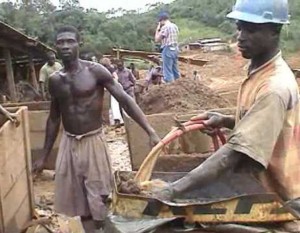Minerals Commission to reclassify small scale mining
 The Minerals Commission is to reclassify small scale mining operations to address challenges posed by illegal mining activities and to ensure that sanity prevails in the mining industry.
The Minerals Commission is to reclassify small scale mining operations to address challenges posed by illegal mining activities and to ensure that sanity prevails in the mining industry.
Dr Toni Aubynn, Chief Executive Officer of the Commission, told a press conference on Thursday that the proposals would help to improve on small-scale mining in the country.
He said the Commission was proposing three broad categories-Artisanal, Small Scale and Medium Scale- Mining operations.
He said under the proposal artisanal mining would be reserved for only Ghanaians and they will have a land size of up to 12.5 acres.
The duration of the license will be up to 5 years, renewable after expiry.
He said artisanal mining would use mainly manual methods to mine alluvial and weathered hard rock material only while a specifically tailored set of environmental and safety requirements would be developed for the sector.
“A monthly levy will be collected; however, there will be no corporate tax, capital allowance or import duty,”Dr Aubynn said.
Similarly, Mr Aubynn said Small Scale Mining operations would be owned by Ghanaians and a land size of up to 25.2 acres.
Small Scale Mining (SSM) licences will be for up to five years, renewable after expiry and both alluvial and hard rock material could be mined.
Also, the use of heavy mining equipment and explosives will be allowed under strict supervision by officials of the Inspectorate Division of the Minerals Commission.
Dr Aubynn said SSM operations would be required to pay royalties, corporate tax and import duties at concessionary rates.
Capital allowance will however be given for mining equipment imported into the country.
He said principal staff of the mine should include at least one mining engineer, one geologist and one accountant while a specifically tailored set of environmental and safety requirements will be developed for the sector.
Dr Aubynn said the land size for medium scale mining would be up to 50.4 acres while license duration will be up to 10 years, renewable after expiry.
Among the licensing requirements would be a business plan or limited feasibility report and posting of a reclamation bond.
The use of heavy mining equipment to mine both alluvial and hard rock material would be permitted.
“Medium Scale Mining operations will be allowed to use explosives; however that can only be done under strict supervision by the Inspectorate Division of the Minerals Commission,” Dr Aubynn said.
He said joint ventures with foreigners will be permitted as long as the proportion of Ghanaian ownership is not less than 51 per cent.
The operations will be required to pay royalties, corporate tax and import duties at concessionary rates.
Capital allowance will, however, be given for mining equipment imported into the country, Dr Aubynn explained, adding that such operations would have among the principal staff at least one mining engineer, one geologist, one metallurgist, one environmental engineer and one accountant.
A specifically tailored set of environmental and safety requirements will be developed for the sector.
Dr Aubynn said the current effort to draft joint regulations between the Environmental Protection Agency (EPA) and the Minerals Commission was a step in the right direction.
This, he said, would help develop specifically tailored environmental management guidelines for the various categorizations.
Dr Aubynn said the re-categorisation of small scale mining into ‘artisanal’ and ‘small scale’ mining would be done after stakeholder consultations.
However, that of medium scale mining will require an amendment to the Minerals and Mining (Licensing) Regulations, the Minerals and Mining (General) Regulations, and the Minerals and Mining (Health, Safety and Technical) Regulations.
Dr Aubynn said to ensure the realization of the framework, the Commission would from the 3rd week of March, 2016 embark on a country-wide stakeholder engagement to explain the new framework as well as solicit their views.
He said since the ultimate objective of the project was to regulate the activities of SSM in Ghana, there was the need to incentivise the various categories in order to encourage them to formalise their activities.
“The licensing requirements, for example, will be reviewed to make it easier for one to acquire a license. Also, measures should be put in place to ensure strict compliance with environmental guidelines,” Dr Aubynn said.
Source: GNA
